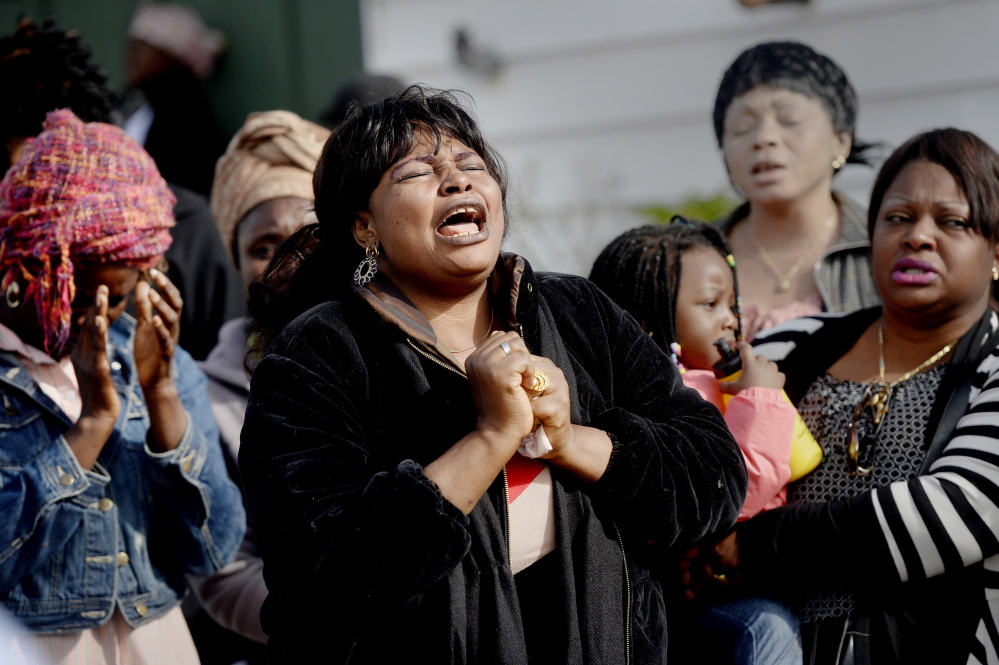From war-torn Angola, rife with corruption and partisan violence, Laudrinha Kubeloso came to Maine seeking safety. But the happy, busy life Kubeloso was building for herself in America was cut short in a hit-and-run accident – carried out, police say, by her former fiance, Evaristo Deus.
In the days after Kubeloso’s death, close friends told the Press Herald she had confided in them that she was afraid of Deus but didn’t follow up with police. Why? We don’t know. But domestic assault is a vastly underreported crime – and for immigrants and refugees like Kubeloso, cultural and social barriers can magnify the difficulty of speaking up. For the community as a whole, this is a chance to examine how to reach immigrants and encourage them to break the silence.
For someone who only lived in Lewiston for about a year, Kubeloso was immersed in life there. She had joined a church and was learning English, applying for jobs and volunteering with a community service center. Her relationship with Deus began on an equally positive note, but as it deteriorated, common warning signs of abuse appeared. Deus was controlling and wanted Kubeloso to do as he said, according to one of her friends.
He also discouraged her from going to church, isolating her from that source of connection and support. After the slaying, people in the community told Kubeloso’s pastor that she’d called off her engagement to Deus when she learned he had been unfaithful – a decision to which Deus responded by threatening to kill her.
Kubeloso never went to police or sought a protection order. There are an array of reasons why immigrant or refugee abuse victims avoid going to authorities: Mistrust of police because of bad experiences in their home countries. Fear of bringing shame upon their community, or pressure from elders not to report. False scenarios, put forward by batterers, that victims who get restraining orders risk deportation.
Nonprofit organizations in Maine are working hard to dismantle these barriers. Several years ago the group United Somali Women of Maine, in collaboration with the Lewiston domestic violence resource center Safe Voices, developed a culturally sensitive list of questions that help assess whether immigrant women have been victims of domestic abuse.
And to try to maintain victims’ confidentiality within the close-knit immigrant and refugee communities, the Portland-based agency Family Crisis Services takes care to use out-of-state interpreters, who are less likely than local ones to have ties to people the victim knows.
Nationwide, anti-domestic violence agencies model other best practices for reaching out to and working with immigrants, like hiring staff who are all or mostly multilingual and promoting agency services via radio and TV shows popular with multicultural audiences.
Social service agencies are carrying out these outreach efforts, but the rest of us can take part, too – by volunteering, donating money or writing supportive letters to the editor. By coming to Maine, immigrants become part of our community, and it’s up to all of us to keep that community strong.
Copy the Story LinkSend questions/comments to the editors.



Success. Please wait for the page to reload. If the page does not reload within 5 seconds, please refresh the page.
Enter your email and password to access comments.
Hi, to comment on stories you must . This profile is in addition to your subscription and website login.
Already have a commenting profile? .
Invalid username/password.
Please check your email to confirm and complete your registration.
Only subscribers are eligible to post comments. Please subscribe or login first for digital access. Here’s why.
Use the form below to reset your password. When you've submitted your account email, we will send an email with a reset code.